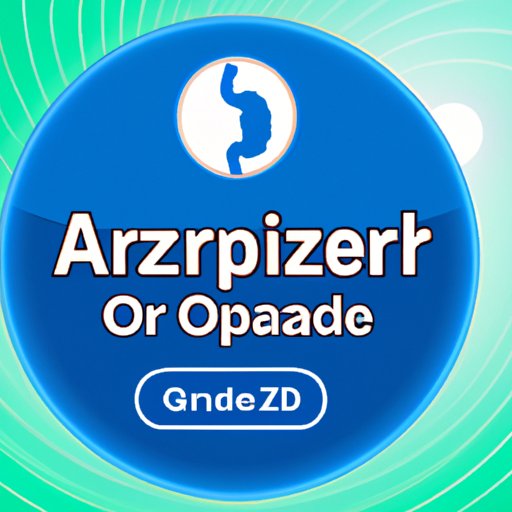Introduction
Omeprazole is a type of proton pump inhibitor (PPI) that is used to treat several conditions related to the gastrointestinal system, including acid reflux and gastroesophageal reflux disease (GERD). PPIs work by blocking the production of stomach acid, which helps to reduce symptoms associated with excessive acidity in the digestive tract. In this article, we will explore how omeprazole works and examine its therapeutic uses, side effects, and safety profile.
Explaining the Mechanism of Action of Omeprazole
Omeprazole belongs to a class of medications known as proton pump inhibitors (PPIs). These drugs work by blocking an enzyme in the stomach called the “proton pump”, which is responsible for producing hydrochloric acid. By blocking the proton pump, omeprazole reduces the amount of acid produced in the stomach, thus reducing the symptoms associated with acid reflux and other conditions related to excess acidity in the digestive tract.
The mechanism of action for omeprazole is different from that of antacids, which are often used to treat mild cases of acid reflux. Antacids work by neutralizing the acid already present in the stomach, whereas PPIs like omeprazole prevent the body from producing more acid. This makes PPIs more effective at treating long-term or chronic cases of acid reflux.
Examining the Therapeutic Uses of Omeprazole
Omeprazole is commonly prescribed to treat conditions associated with excess acidity in the digestive tract, such as gastroesophageal reflux disease (GERD), erosive esophagitis, and peptic ulcers. It is also used to treat heartburn, indigestion, and other symptoms of acid reflux. In addition, omeprazole may be used to treat certain types of infections caused by Helicobacter pylori bacteria.
In clinical trials, omeprazole has been shown to be effective at reducing symptoms of acid reflux in both short-term and long-term treatment plans. According to a study published in the New England Journal of Medicine, patients taking omeprazole experienced significantly fewer symptoms of GERD after just two weeks of treatment, compared to those taking a placebo.
Describing the Adverse Effects Associated with Omeprazole Use
Like all medications, omeprazole can cause side effects in some people. Common side effects include headache, nausea, diarrhea, abdominal pain, and constipation. Other potential side effects include dizziness, fatigue, chest pain, and blurred vision. In rare cases, people taking omeprazole have reported experiencing more serious side effects, such as liver damage, kidney problems, and an increased risk of bone fractures.
It is important to note that omeprazole can interact with other medications, so it is important to tell your doctor about any other medications you are taking before starting treatment. Some medications, such as warfarin, should not be taken with omeprazole. In addition, people who take omeprazole should avoid drinking alcohol, as this can increase the risk of side effects.

Evaluating the Safety and Efficacy Profile of Omeprazole
Omeprazole has been extensively studied in clinical trials, and the results of these studies have consistently demonstrated its effectiveness in treating acid reflux and other conditions related to excess stomach acid. For example, a study published in the Annals of Internal Medicine found that omeprazole was more effective than ranitidine (another popular PPI) at reducing symptoms of GERD.
In terms of safety, the side effects associated with omeprazole are generally considered mild and manageable. However, it is important to talk to your doctor about any concerns you may have, as there may be other medications that are better suited for your condition.

Comparing Omeprazole to Other Acid Reflux Medications
When it comes to treating acid reflux, there are a variety of medications available. Antacids, such as Tums and Rolaids, are often used to treat mild cases of acid reflux, while PPIs like omeprazole are typically used to treat more severe cases. Antacids work by neutralizing the acid already present in the stomach, while PPIs like omeprazole work by blocking the production of stomach acid.
Antacids are generally considered safe and effective, but they do not provide long-term relief from acid reflux symptoms. On the other hand, PPIs like omeprazole are more effective at providing long-term relief, but they can have more serious side effects if taken for extended periods of time.

Outlining the Dosage Guidelines for Omeprazole
When taking omeprazole, it is important to follow the dosage instructions provided by your doctor. The typical recommended dose for adults is 20 mg once daily, although some people may require higher doses. It is important to take the medication at the same time each day, and not to exceed the recommended dose. Taking too much omeprazole can lead to an overdose, which can be dangerous.
It is also important to note that omeprazole should not be used for longer than four weeks without consulting your doctor. Long-term use of omeprazole can increase the risk of certain side effects, such as bone fractures and vitamin B12 deficiency.

Investigating the Common Misconceptions about Omeprazole
Despite its proven efficacy and safety profile, there are still many misconceptions about omeprazole. One of the most common myths is that omeprazole causes weight gain. While it is true that some people taking omeprazole may experience weight gain, this is usually due to other factors, such as lifestyle changes or an underlying medical condition.
Another myth is that omeprazole is addictive. However, this is not true. In fact, omeprazole has not been shown to be habit-forming or addictive in any way.
Conclusion
Omeprazole is a type of proton pump inhibitor (PPI) that is used to treat several conditions related to the gastrointestinal system, including acid reflux and gastroesophageal reflux disease (GERD). It works by blocking the production of stomach acid, which helps to reduce symptoms associated with excessive acidity in the digestive tract. In addition, omeprazole has been shown to be effective and safe in clinical trials, making it a viable treatment option for many people.
(Note: Is this article not meeting your expectations? Do you have knowledge or insights to share? Unlock new opportunities and expand your reach by joining our authors team. Click Registration to join us and share your expertise with our readers.)
